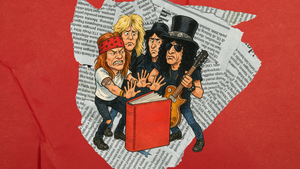Veteran music manager Alan G Niven has sued Guns N Roses, a band he once managed, accusing them of blocking the publication of his ‘Sound N Fury’ autobiography by enforcing an “unconscionable” contract term from a 1991 agreement. That’s despite the band themselves repeatedly breaching the same term, which was contained in a contract Axl Rose never bothered to sign.
Despite the autobiography being announced a year ago, the band waited until May this year to formally object to its publication. As a result, the book had already been printed by the time Guns N Roses decided to intervene, and thousands of copies are now sitting in a warehouse gathering dust.
“Due to GNR’s threats, ‘Sound N Fury’ languishes in a warehouse”, Niven’s lawsuit states. “The book was meticulously designed and printed. It was announced in the book trade. Review copies were sent out. Niven began the podcast promotional circuit”. And then the band's legal letter arrived claiming that the 1991 contract, signed when Niven and GNR parted company, had been breached.
Niven wants the court to issue a declaration that “he may tell his story” and legally “publish his autobiography, despite the threats of GNR”. He’s also seeking damages from the band for their interference in his contract with his book’s publisher, ECW Press.
Niven describes himself as a “music manager, musician, producer, writer and story-teller”. He began his career at Virgin Records in 1974, working in labels and distribution in the 1970s and 1980s, before moving into artist management. He managed GNR between 1985 and 1991, taking the band - his lawsuit claims - from “nowhere to headlining Wembley Stadium in less than six years”.
His working relationship with the band fell apart in 1991, resulting in a ‘buyout agreement’ which, among other things, contained mutual privacy and confidentiality provisions. It’s those provisions that GNR are now looking to enforce because ‘Sound N Fury’, which covers events from across Niven’s music industry career, includes a section about his time managing the band.
Describing the 1991 confidentiality provisions, Niven’s lawsuit says that, “in broad strokes, GNR and Niven agreed that efforts would be made to maintain the confidentiality of information concerning each other learned during their mutual association”.
But there are various issues with that element of the 1991 agreement, Niven argues. First, it was negotiated at a time when Niven was “under severe personal distress” because he had been “betrayed” by both the band he’d managed for six years and “his former employee, the band’s lawyer”.
Which presumably means he agreed to terms that he would not have accepted in other circumstances. Not least because the confidentiality provision has an “unlimited duration” and breaches “Niven’s right to speak freely about his own past”, which renders it “unconscionable” and therefore "unenforceable".
On more practical matters, the agreement also stated that all parties had to sign the deal for it to go into force, but frontman Axl Rose never signed. And then there’s the fact that band members have publicly discussed their work and relationship with Niven over the decades - sometimes in unflattering terms - which Niven’s lawyers say is a clear violation of the confidentiality provision.
The lawsuit also explains that it’s “unclear” who from the band’s classic line-up is now “attempting to enforce” the 1991 agreement. The fact Rose never signed the contract arguably makes it unenforceable in its entirety, but it’s all the more annoying for Niven if it’s actually Rose that is trying to block the book, given he didn’t even sign that contract.
Niven says he’s not been able to settle his current dispute with the band, which is why he needs the court to now state that publication of his book will not open him or ECW Press to any liabilities under the 1991 agreement.
And the sooner the court can do that, the better. “Thousands of copies of ‘Sound N Fury’ have been printed and continue to incur storage expenses”, the lawsuit says, adding, “the release date has been moved several times” and “Niven has accrued advance orders” that he can’t currently fulfil.
Which is all very annoying. Although, now this dispute has prompted a lawsuit - and assuming the books are ever allowed out of the warehouse - maybe the litigation will raise the profile of Niven’s autobiography and help shift more copies. Not that anyone in the music business would be that cynical.

